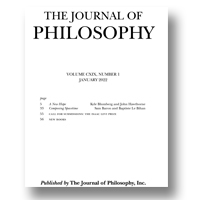|
1.
|
The Journal of Philosophy:
Volume >
114 >
Issue: 4
Giuliano Torrengo
Feeling the Passing of Time
abstract |
view |
rights & permissions
| cited by
There seems to be a "what it is like" to the experience of the flow of time in any conscious activity of ours. In this paper, I argue that the feeling that time passes should be understood as a phenomenal modifier of our mental life, in roughly the same way as the blurred or vivid nature of a visual experience can be seen as an element of the experience that modifies the way it feels, without representing the world as being in a certain way. I defend my positions against the deflationary view according to which the passing of time does not have a specific phenomenal character, and the representationalist view according to which the feeling of time passing is a feature of the representational content of our experience, like being red or yellow.
|
|
|
2.
|
The Journal of Philosophy:
Volume >
114 >
Issue: 4
Sebastian Köhler
Expressivism, Belief, and All That
abstract |
view |
rights & permissions
| cited by
Meta-ethical expressivism was traditionally seen as the view that normative judgements are not beliefs. Recently, quasi-realists have argued, via a minimalist conception of “belief”, that expressivism is fully compatible with normative judgements being beliefs. This maneuver is successful, however, only if quasi-realists have really offered an expressivist-friendly account of belief that captures all platitudes characterizing belief. But, quasi-realists’ account has a crucial gap, namely how to account for the propositional contents of normative beliefs in an expressivist-friendly manner. In particular, quasi-realists haven’t yet developed their preferred option, a “minimalist” or “deflationist” account of such contents. This paper aims to close that gap. I argue that expressivists who accept conceptual role semantics and use an account of that-clauses in their use in belief-attributions based on Wilfrid Sellars’ work can give a deflationary account of the contents of beliefs that is compatible with normative judgements being beliefs, even if expressivism is true.
|
|
|
3.
|
The Journal of Philosophy:
Volume >
114 >
Issue: 4
Gregory Robson
Punishment: A Costly Signal?
abstract |
view |
rights & permissions
| cited by
In “Punishment as a Costly Signal of Reform,” Jim Staihar argues that prisons should provide inmates with opportunities to sacrifice in ways that signal their genuine reform to others. I first show why Staihar’s program would be valuable, but only in restricted contexts. I then argue that costly signaling programs will usually be either not sufficiently costly to be taken seriously by the signal’s receivers or not rational for inmates in harsh prison environments to complete. Next, I consider the worry that some inmates will choose to participate in costly signaling programs as mimics, rendering ineffective the signals of truly reformed inmates. What Staihar must say, but does not, is why the non-mimicker’s expected utility gain will be sufficiently higher than the mimicker’s such that only sincere participation is incentivized. I conclude by showing why Staihar’s proposal could nevertheless be a valuable part of a hybrid program of legal punishment.
|
|
